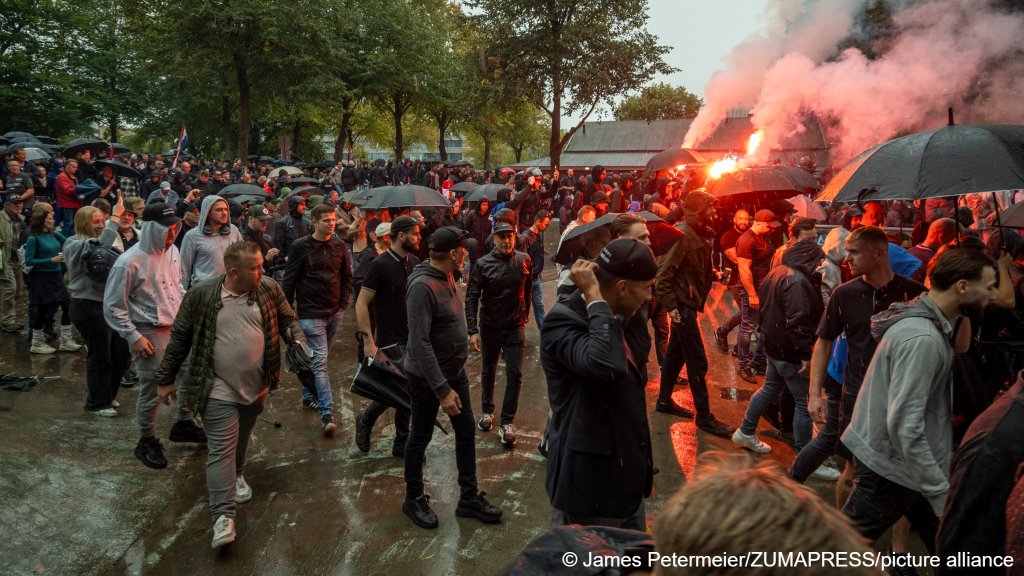The Dutch government announced that in 2023, almost 8 percent of rental properties administered by housing associations in the country were used by asylum seekers. The Netherlands, like several other European countries, has for years been battling a housing shortage, especially in the social housing market, which has been one of the main drivers for growing anti-refugee sentiments in the country.
In total numbers, 12,729 households with one or more asylum seekers were living in social housing units run by housing associations in 2023 — out of a total of 161,000 units made available that year.
The number of asylum seekers accommodated in such rental properties run by housing associations in the Netherlands in 2023 was roughly one percentage point higher than the figures obtained in 2022 by the government's chief data collection agency, Statistics Netherlands (CBS). The 2023 figures are the most recent data available.
In some years before the COVID-19 pandemic, the rate of asylum seekers housed in housing associations in the Netherlands was at times as low as 4 percent — half the rate of what was measured for 2023.
One third of housing in the Netherlands part of social system
Nearly one third of all housing stock in the Netherlands is made up of various forms of social housing units, according to a 2023 study published at Harvard University.
The vast majority of social housing is provided by housing associations, which are mandated and regulated by law, placed under the oversight of central government and run in tandem with local government needs.
However, these housing associations do not receive any direct funding from the government itself; instead, they are fully funded by the rental income they make, with any profits being invested back into building new housing stock — similar to the way a not-for-profit organization is run.
The 2023 statistics provided by CBS are the most recent data points available.
The unique role — and responsibility — of housing associations
In the context of these CBS figures, the term "asylum seeker" only encompasses people whose applications have been approved and who have received residency permits for the Netherlands, as people whose asylum cases are still under review usually do not qualify for the accommodation solutions that involve housing associations — with rare exceptions involving extreme cases.
This is because housing associations are not proactively approached by local governments to meet their needs; rather, the usual route for housing associations is to proactively approach the local government if, when and as housing stock becomes available to have new tenants assigned to.
The local government then typically matches up people from a waiting list, according to the quotas and housing laws it has to abide by; only approved asylum seekers can be on that list, unless there is an extreme case of hardship.
Therefore, the statistics likely reflect a picture that is very close to the actual reality on the ground when it comes to the number of asylum seekers who were placed in housing association-run social housing.

Read AlsoDutch government wants to send children with rejected asylum claims to 'return hubs'
Attempts to change housing law for refugees
According to the CBS statistics, the city of Alkmaar and its surrounding areas, which are located about 40 kilometers north of Amsterdam, had the highest rate of social housing units given to asylum seekers, peaking at around 13 percent.
Meanwhile the municipality of Delfzijl and its surrounding region, situated on the opposite end of the country and bordering Germany at the estuary of the Ems river, had the smallest amount of social housing units allocated to asylum seekers at only 2 percent of its entire availabilities.
The high rate of social housing being given to asylum seekers and migrants in some parts of the country where housing shortages are particularly severe, has led to repeated clashes in the past, amid a rise of the far-right in the country.
Read AlsoWhy are people protesting against asylum in the Netherlands?

According to Dutch law, municipalities must allocate a certain portion of their social housing units to asylum seekers, using housing associations are the intermediary in the majority of cases, with bigger municipalities required to house more asylum seekers than smaller ones.
However, there are motions in place to change this rule at the central government level.
Read AlsoImmigration a key topic in 2025 Netherlands election
New government, new rules?
The current caretaker government of the Netherlands has said that it wants to abolish quotas for municipalities to house asylum seekers according to their size and in fact go as far as banning local governments from prioritizing refugees at all if the social housing market in a particular region has scarce inventory.
The Council of State, which is a constitutional advisory body to the government, which also serves as the highest administrative court in the Netherlands, has criticized the plan, with the government's chief advisor saying that this bill to abolish priority for asylum seekers was unconstitutional.
By the time the bill reaches its final levels of parliamentary debate, however, the new government might already be in place; with a marked departure from ultra-right policies expected to be at the heart of the new leadership, amendments to the bill therefore are likely, including the potential of scrapping it altogether.

Read AlsoAsylum reform advances in Dutch parliament ahead of snap elections
